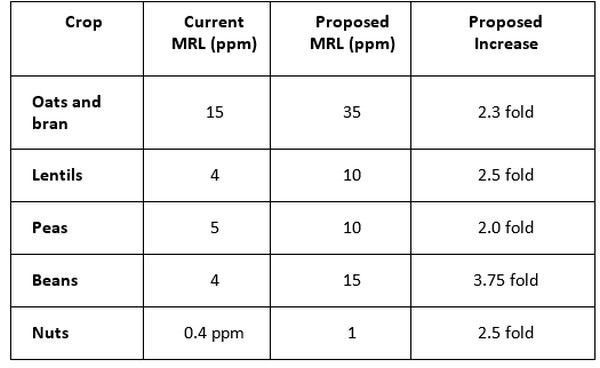The Pest Management Regulatory Agency (PMRA) is proposing to increase the amount of glyphosate (e.g., Roundup®) permitted in Canadian food. Maximum Residue Limits (MRLs) may be doubled, tripled, or almost quadrupled for oats and bran, lentils, peas and 25 types of beans such as chickpeas, kidney beans and pinto beans, as well as nuts (almonds, pecans and walnuts, mostly coming from the US).

Why should the organic industry care?
Farmers are using more glyphosate-based herbicides (GBHs). This amounts to a regulation of the status quo.
Organic prohibits the use of glyphosate yet it is persistent in the air due to non-organic farmers' prolific use of glyphosate in North America. Unintentional contamination is becoming more and more problematic and is addressed under the following protocol to acknowledge that contamination is possible. As the testing protocol for organic products is based on 5% of the MRL, the proposed increase to the national MRLs for the above products means that organic products will have an increased allowance of glyphosate permitted.
"This is a move in the wrong direction allowing more contamination in organic products and allowing more prolific use of glyphosate into our food supply as well as affecting soil health and pollinators," states Tia Loftsgard with the Canada Organic Trade Association.
"As weeds become resistant, higher herbicide doses affect the environment, contaminate our food and risk our health. This model threatens Organic Agriculture, and does not optimize carbon capture in soil, support biodiversity, nor build resilience to face the climate crisis."
Whose food will be most affected?
"Canadian children. Glyphosate in childrens’ cereals (in oats and bran) are already at alarming levels. Besides, organic consumers who are purchasing organic for the purpose of avoiding pesticides for health or ethical reasons. Finally, vegetarians, vegans and everyone who gains protein from “conventionally” grown legumes and nuts are at risk of consuming more glyphosate."
The organic sector needs to act now to prevent this increase of Maximum Residue Levels from occurring. July 20th is the final deadline to submit your feedback.
Please use the facts outlined in the fact sheet attached to submit your opposition. PMRA is only willing to consider scientific rationales on the impact of dietary health as part of this consultation, despite the fact that the economic ramifications to the organic sector will be plentiful. Please ensure you use the scientific studies as well as the impact this will have on the organic sector.
Please write your MP, the media and circulate them to all stakeholders to ensure that your feedback is heard.
Have your say, by Tuesday July 20th.
Tell the PMRA what you think of PMRL2021-10.
Email your comments to hc.pmra.publications-arla.sc@canada.ca, or comment online, on “Proposed measures” for PMRL2021-10.
Please consider sharing your input:
info@canada-organic.ca
Info@PreventCancerNow.ca
SafeFoodMatters@gmail.com
Comments should have a scientific basis and reference the content of PMRL2021-10.
For more information:
Tia Loftsgard, Executive Director
Canada Organic Trade Association
Suite 210-4 Florence Street
Ottawa, ON K2P 0W7
Phone: 613-482-1717 ext. 200
Fax: 613-482-2920
tloftsgard@canada-organic.ca
www.canada-organic.ca
